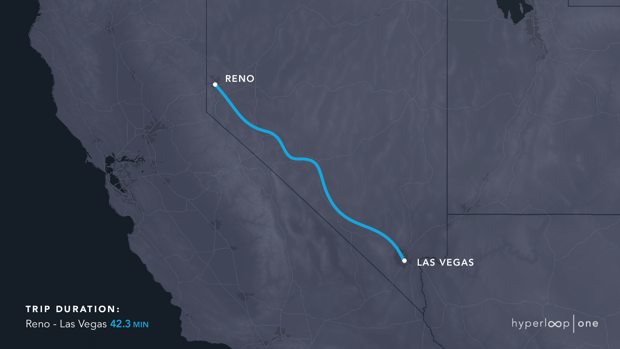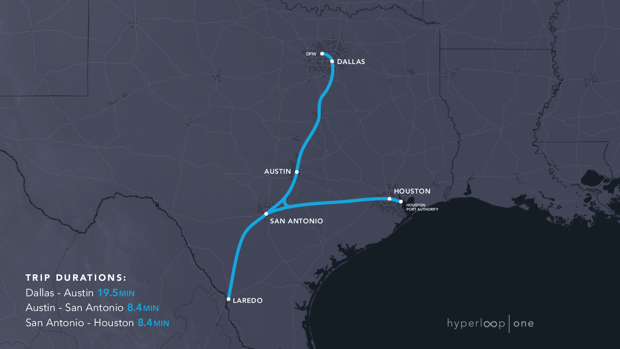Connecting state and local government leaders
One company is making progress on the technology, but where it ends up is an open question.
After years of uncertainty and skepticism over the future of Hyperloop, one of the companies pioneering the technology eagerly marched to Washington, D.C., last week with some news: the vision of supersonic transportation via a series of airtight tubes is actually tangible now.
Hyperloop One recently announced that it has built the U.S.’s first testing site, a 1,640-foot long full-scale track in the deserts of Nevada, putting the company one step ahead of its competitors in the race to build Elon Musk’s futuristic transportation system. Engineers have already begun testing some components, including the propulsion system and the vacuum. The company plans to have a full system test—what it calls its “Kitty Hawk” moment—by the end of this year. It’s also collaborating with regulators in Dubai to create a framework for testing the system’s safety and feasibility, according to CEO Rob Lloyd. And if all goes as planned, cities across the U.S. could become metro stops just minutes apart from one another.
So where should the Hyperloop go? Eleven U.S. teams from Hyperloop One’s Global Challenge stood under a soft blue glow inside a D.C. conference room on Thursday as they presented their ideas for the futuristic ride. Together they represent 35 metro areas that could someday be connected by the Hyperloop. Team Nevada proposed a 454-mile route running from Reno to Las Vegas, carrying freight from one of the country’s largest industrial centers to the state’s most popular city. “Our highways and railroads are gridlocked trying to move freight throughout the country, and we have a society that wants things on demand,” says Sondra Rosenberg, the assistant director of planning at the Nevada Department of Transportation. According to her team’s proposal, the state’s freight flow is expected to grow from 132 million tons in 2015 to 191 million tons by 2045, which would be worth $305 billion. On the Hyperloop, that could be placed on pods big enough to fit a shipping container and whizzed to its destination in a matter of minutes.

Meanwhile, Texas hopes to connect five of its major cities for commuters’ sake, aiming to ease traffic congestion on the highways and zip commuters from, say, Austin to Dallas in just 20 minutes. Team Florida proposed a route that would boost local tourism between Orlando and Miami, while the Midwest team aims to connect Chicago, Columbus, and Pittsburgh.
The teams are among 35 semi-finalists (and just a fraction of the 2,600 applicants from over 100 countries), which will soon be narrowed down to just 12 finalists. “We're looking for those first two or three routes around the world to start construction, and we're working with the [Dubai] government to improve the safety case,” Lloyd tells CityLab, adding that he wants to see at least one of those routes be in the U.S. “This event is really our official kickoff as to how we're going to move forward in collaborating with the U.S. government.”
Lloyd says Hyperloop will likely be approved for freight transport first, which would allow the company to demonstrate the safety of such an advanced system. Ultimately, though, it would be capable of transporting both cargo and human passengers. But while much of the focus has been on the safety and reliability of the technology—and rightly so—Alan Berger, a professor of urban design and landscape architecture at MIT, has been thinking about where and how to design the routes so it benefits the most people.
His argument: build it around the cities.
Berger was among the panelists speaking at the event, and also one of the judges reviewing the 11 proposals the day before. His role was to help the “technology minds” understand the urban planning issues around mobility in the U.S. “The Hyperloop shouldn’t go into the city,” he says. “It should be trying to capture, in a concentric city model, all the peripheral movement.” Most people, he adds, move from one periphery area to another instead of traveling into the city, anyway. In that sense, the system should work for people living in suburban or ex-urban areas, which he says make up some 70 percent of the American population.
The critical mobility issue for that population is that they’re tied to the car, Berger says; these areas often lack mass transit systems that connect with other low density areas. “In a concentric city, there’s a lot more activity moving around, so there’s no need [for the Hyperloop] to go into the center of the city,” he tells CityLab. “Instead, take care of where there is no transportation solution other than ones with heavy carbon footprints and high impact on watersheds and natural habitat.”
Even if there were a high-speed rail system, Berger argues that it doesn’t solve the first- and last-mile problem—that is, people still need to drive a car to and from the station. He imagines that Hyperloop could one day accommodate autonomous vehicles, shooting them right through the tube to the commuter’s destination. That way, passengers won’t have to leave their vehicles until the very end.

To Berger, “that’s most interesting urban scenario—when those technologies are packeted together, and the last-mile part is solved.” Of course, the future of AV itself is still unclear, and the Hyperloop is still at the very early stages of testing. The science and technology seems promising, but there are still several barriers to making the Hyperloop a reality, one of them being the government.
Speaking on the panel was former U.S. Secretary of Transportation Anthony Foxx, who has long voiced his support for new transportation technology. He also emphasizes that the Hyperloop can’t happen without government cooperation. “The government has to understand that sometimes you regulate when you have mature technology,” he told the audience. “But sometimes you have to think in terms of creating outcomes that you want … and letting the innovation reach those outcomes and creating dialogue with the industry as that happens.”
And as many have pointed out, acquiring land will be one of the biggest hurdles. Aside from funding, local support, and potential economic return, Lloyd says his company is also judging the proposals based on how well the teams “identify a logical right-of-way” to build the actual track and stations. Most proposals imagine the Hyperloop—either built underground or sitting on pillars above ground—spanning across vast unused and flat land.
Proponents of the Hyperloop cite elements like its elevated structure and the potential of operating along existing highway right-of-way as a key reason why the system would be cheaper than building a high-speed-rail, which would require outright land acquisition. But as a feasibility report from the Department of Transportation points out, “the technology is still conceptual and in very initial testing, there is uncertainty in both the underlying infrastructure needed to operate a system and the cost to construct it.”
Not to mention the bureaucratic hurdles. For a Hyperloop route to go along Interstate 5 in California, the company would require cooperation from a handful of government agencies: Caltran, the state, and all the municipalities that route crosses through, according to Christopher Hawthorn, the architecture critic for the L.A. Times. ”So the political complications that have made life difficult for supporters of high speed rail will not disappear if and when Hyperloop is ready to be built,” he said in a video interview for Van Alen Sessions.
But when it comes to getting public and governmental support, Lloyd isn’t worried. When asked how federal regulators in D.C. responded to the idea during their visit, he assures me that they were positive. “We waited to come to D.C., when we had clear signs of ground swell of support from several states,” he says, “and when we're just months away from the full-scale demonstration of the technology. And we've built a team here now so that we can sustain conversation with the biggest potential customer in the world—the U.S.”
Linda Poon is an assistant editor at CityLab where this article was originally published.

NEXT STORY: FedRAMP seeks to further streamline approval process



